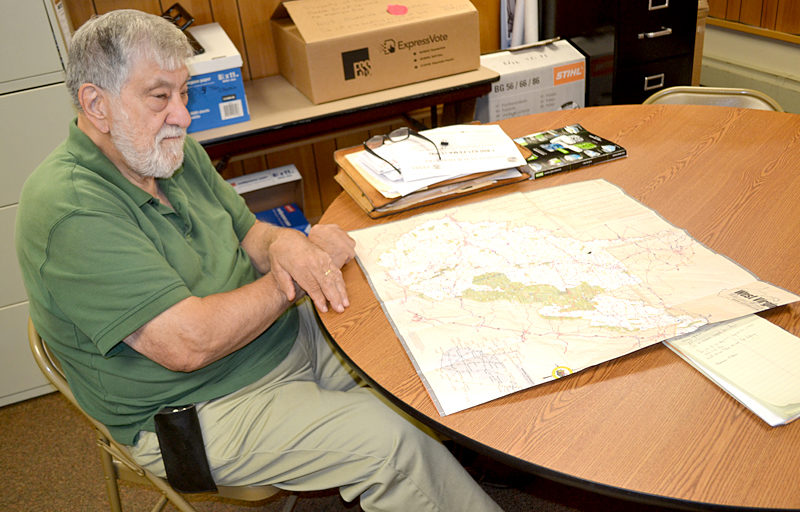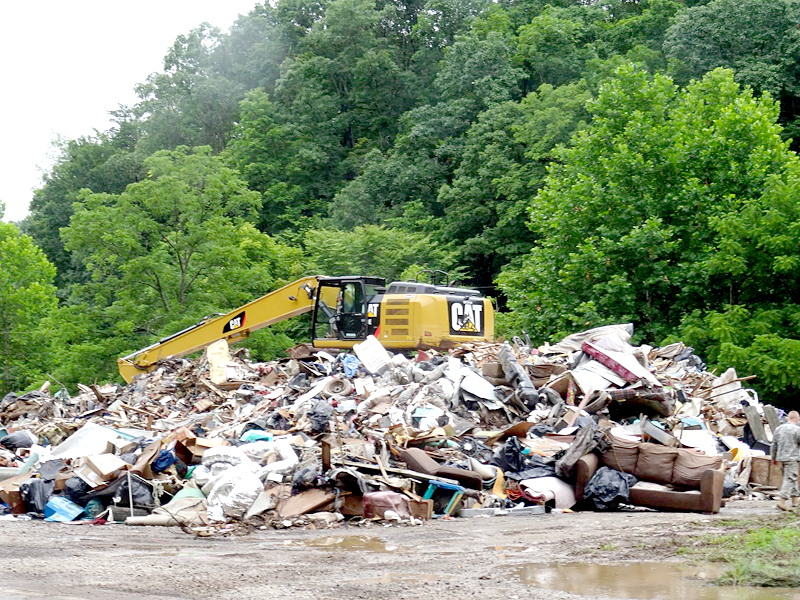
Dr. Jack Sarmanian, of Edgecomb, a Red Cross disaster mental health worker, looks over a map of West Virginia on Tuesday, July 12, following his return from a deployment to assist flood victims. (Abigail Adams photo)
The flooding in West Virginia in late June was a one-in-1,000-years event for the state, according to meteorologists. For Edgecomb Selectman and American Red Cross disaster mental health worker Dr. Jack Sarmanian, it was one of his most difficult deployments to date.
In his role with the Red Cross, Sarmanian has provided relief to tornado victims in Minneapolis and Oklahoma, and support to the survivors of a mass shooting on a college campus in Roseburg, Ore. From June 30 to July 9, Sarmanian was navigating the washed-out roads of West Virginia in search of flood victims in need of assistance.
Sarmanian joined the Red Cross upon retirement from a long career in the mental health field. He holds degrees in psychology, human relations, social work, and education and counseling, and has worked as a counselor, researcher, administrator, and educator.
Sarmanian and his fellow volunteers with the Red Cross were among the first points of contact for individuals hit hard by the torrential rains and flash floods in West Virginia on June 23 and 24. He traveled upward of 100-150 miles a day, checking on houses listed in the 911 address database to find flood victims and connect them to disaster relief.
Roads and bridges throughout the state were washed out, disconnecting victims from relief efforts, Sarmanian said. Telephone lines were down and cellphone reception was non-existent in many places in the mountainous region, he said.
However, the resiliency of the people he met in West Virginia was amazing, Sarmanian said. Several people, when contacted by the Red Cross, attempted to turn down the assistance so the Red Cross could instead aid their neighbors, he said.
Through the Red Cross, immediate needs such as food, water, and cleaning supplies were distributed, and disaster assessments were completed, Sarmanian said. The disaster assessments enable residents to access more permanent relief from the Federal Emergency Management Agency, which is providing flood victims with the resources to rebuild.
FEMA has been authorized to distribute about $10 million to homeowners and renters in the West Virginia counties where a state of emergency has been declared, according to media reports.
The West Virginia floods were “an immense phenomenon,” Sarmanian said, with many in the mountainous region unprepared for the deluge that killed at least 23 people and caused an estimated $100 million in damage to public property alone.

Every couple of miles in West Virginia, residents’ personal possessions can be seen piled into garbage heaps after being destroyed in late June floods. (Photo courtesy Diana Blanchette)
For some residents, every possession they had – furniture, appliances, houses, cars – was either washed away or destroyed, Sarmanian said. Every couple of miles, the possessions in water-logged homes could be seen piled in a heap by the street so they could be hauled away, he said.
The Red Cross was hoping to deploy about 30 mental health workers to West Virginia to aid in the recovery effort, but only 10 mental health workers were able to respond, including Sarmanian, he said. With the flooding in Texas in late May and the shooting in Orlando, Fla., Red Cross volunteers are spread thin throughout the country, Sarmanian said.
While Sarmanian helped flood victims come to terms with their loss, and monitored the mental health of other volunteers – many of whom had completed several deployments in a row – the focus in West Virginia was on survival, he said. Food, water, medicine, cleaning supplies, and emergency funds were distributed by volunteers.
Residents were either transported to distribution centers to receive supplies, or supplies were delivered directly to residents, Sarmanian said. Some were connected to shelters when their houses were uninhabitable; others in need of acute medical care were transported to hospitals or nursing homes.
“A lot of people were asking ‘where do we go from here?’ They lost everything,” Sarmanian said. “Their homes, their lives were totally disrupted. They have to start all over again, but where do you even start?”
Despite the shock residents were experiencing, Sarmanian was struck by the resiliency and resourcefulness of the people. “They were strong mountain people,” Sarmanian said. “They were resourceful, resilient, and grateful,” he said.
Red Cross volunteers were thanked profusely wherever they went, Sarmanian said. “People were happy we were there,” he said.
With the mountainous terrain, washed-out roads and bridges, non-functioning GPS, lack of cellphone service, and the amount of travel required, Sarmanian said his deployment to West Virginia with the Red Cross was his most difficult to date.
Despite the difficulty involved, Sarmanian will continue his work with the Red Cross. In addition to future deployments to declared disaster areas, Sarmanian is also working with the Red Cross to provide mental health resources to veterans and their families.
“People ask me why I do it,” Sarmanian said. “It’s because there’s so much work to be done.”



